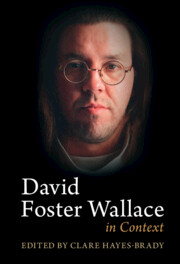Book contents
- David Foster Wallace in Context
- David Foster Wallace in Context
- Copyright page
- Contents
- Figures
- Contributors
- Acknowledgments
- Abbreviations
- Introduction
- Part I Contexts
- Part II Ideas
- Part III Bodies
- Part IV Systems
- Chapter 26 Infinite Jest as Opiate Fiction
- Chapter 27 David Foster Wallace and Racial Capitalism
- Chapter 28 Language and Self-Creation
- Chapter 29 Very Old Land
- Chapter 30 David Foster Wallace’s Ecologies
- Chapter 31 “I Could, If You’d Let Me, Talk and Talk”
- Chapter 32 David and Dutch
- Chapter 33 David Foster Wallace and Publishing
- Chapter 34 Author Here, There and Everywhere
- Works by David Foster Wallace
- Bibliography of Secondary Sources
- Index
Chapter 32 - David and Dutch
Wallace, Reagan and the US Presidency
from Part IV - Systems
Published online by Cambridge University Press: 18 November 2022
- David Foster Wallace in Context
- David Foster Wallace in Context
- Copyright page
- Contents
- Figures
- Contributors
- Acknowledgments
- Abbreviations
- Introduction
- Part I Contexts
- Part II Ideas
- Part III Bodies
- Part IV Systems
- Chapter 26 Infinite Jest as Opiate Fiction
- Chapter 27 David Foster Wallace and Racial Capitalism
- Chapter 28 Language and Self-Creation
- Chapter 29 Very Old Land
- Chapter 30 David Foster Wallace’s Ecologies
- Chapter 31 “I Could, If You’d Let Me, Talk and Talk”
- Chapter 32 David and Dutch
- Chapter 33 David Foster Wallace and Publishing
- Chapter 34 Author Here, There and Everywhere
- Works by David Foster Wallace
- Bibliography of Secondary Sources
- Index
Summary
The revelation that David Foster Wallace voted for Ronald Reagan caused surprise among Wallace’s readers, many of whom had seen Infinite Jest’s Johnny Gentle as an excoriating parody of Reagan’s persona and politics. While Gentle is undoubtedly a partial caricature, Wallace’s connection to Reagan, and indeed the concept of political leadership, is more complicated than it might first appear. In his essay on John McCain, Wallace uses Reagan to outline a difference between two political personae, suggesting that the first figure, a “leader,” whatever their moral foibles, has the ability to “help us overcome the limitations of our own individual laziness and selfishness and weakness and fear and get us to do better, harder things than we can get ourselves to do on our own.” The second figure is a “salesman,” whose “ultimate, overriding motivation” (despite having the charisma of a leader) is “self-interest.” During Wallace’s career, his position on Reagan’s status gradually changes from the former to the latter, and this transition illuminates an important shift in both Wallace’s politics and the subjects of his writing, one particularly evident in the increased focus on “civics” in the later fiction.
Central to this shift is the short story “Lyndon,” which I argue is partially an analogy for Reagan’s second term and his response, or lack of response, to the AIDS crisis. The story is also, crucially, a dramatization of the death of “New Deal” politics and the steady encroachment of neoliberalism, this latter famously becoming the subject of intense critique in Wallace’s later writing, especially The Pale King, which is itself set in Reagan’s second term. Through a discussion of “Lyndon,” Infinite Jest, The Pale King and the McCain essay, and concluding with an analysis of Wallace’s unpublished short story “Wickedness” that features a dying Reagan, I argue that Reagan comes to stand as perhaps the figure of single widest-ranging importance to understanding the politics of Wallace’s writing.
Keywords
- Type
- Chapter
- Information
- David Foster Wallace in Context , pp. 346 - 356Publisher: Cambridge University PressPrint publication year: 2022



